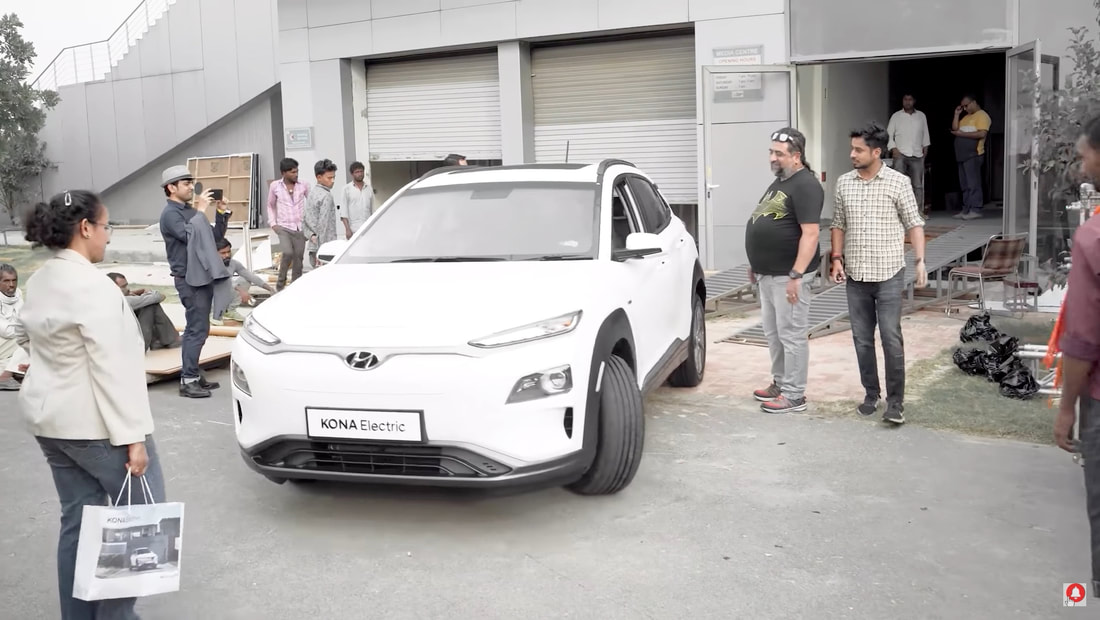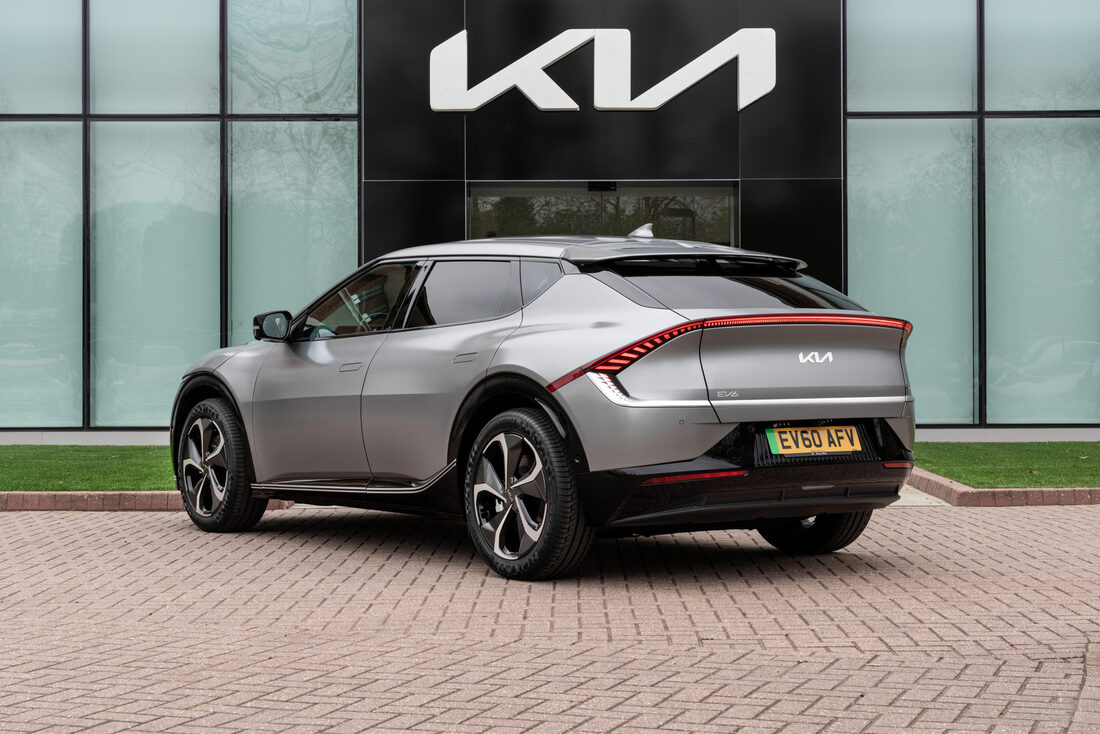By Abhishek & Kamlesh
In this episode of Electric Car watch, we will talk about Hyundai's sudden announcements regarding EV plans for India and if they can retain their market share in India by 2030.
In this episode of Electric Car watch, we will talk about Hyundai's sudden announcements regarding EV plans for India and if they can retain their market share in India by 2030.
Video: Electric Car Watch : Hyundai India's sudden EV Push | Ioniq 5 in 2022
So Hyundai India has announced a Rs 4000 CR investment which will help them launch affordable and premium electric models, including SUV’s and sedans, in India starting 2022. Tarun Garg, director sales and marketing for Hyundai Motor India, said, "We want to be a key contributor to the EV story in India. The investment will be sunk into research and development to launch the six vehicles. The Kona’s launch was about testing the waters in India. The learnings from it have given us the confidence to make this push.”
Let’s be honest here. The Hyundai Kona launch in 2019 was a pure publicity/PR stunt. They only sold a limited number of Konas, which have not performed well. We have heard of Indian Kona owners facing battery issues, which resulted in battery replacements that took many weeks as Korean teams had to remotely diagnose issues and there were no Indian RnD teams. Also, the replacement batteries had to come all the way from Korea. Launching an imported CKD kit in India was never a long term solution. I think the recent announcements made by Tata and Mahindra, who have announced investment of thousands of crores in EV development, seems to have set the alarm bells ringing at Hyundai India. Hyundai India is the second largest passenger car seller after Maruti. If they want to retain their market share by 2030, they will have to focus on Electric Cars in India.
And why should Hyundai focus on Electric cars in India?
There are two reasons.
Ultimately, Hyundai can’t treat India like a 3rd world car market and keep dumping pollution cars on it this decade. We are glad Hyundai India is seeing the light now at least. So globally how is Hyundai performing? Hyundai reported a 21% decrease in its global car sales in October to 307,039 units. The plug-in EV segment continues to grow. Reaching a new all-time monthly record, In October, the company sold 18,694 plug-ins (up 60% year-over-year). This includes 14,243 Pure Battery Electric Cars, 4,451 Plugin Hybrids, and 1010 Fuel Cell cars. Meanwhile, Hyundai sold 18 Konas in India.
E-GMP platform and Battery Cell Manufacturing
In 2020, Hyundai revealed their E-GMP – the Electric Global Modular Platform, a dedicated platform made especially for EV’s. It comprises the chassis of the vehicle, including the battery, motor and power electric system, and its scalable for different types of vehicles. The platform will be shared by both Hyundai and Kia automobiles. The platform has an 800 V architecture and supports batteries from multiple manufacturers. The electronics support both 400 V and 800 V charging and bidirectional charging. The platform can support fast charging upto 200 kW. Just to give you an idea, electric cars in India like Nexon EV charge at 25 kW whereas cars like MG can charge at 50 kW rate today. The Hyundai Ioniq 5 and Kia EV 6 are the first production cars that are using this platform.
Hyundai Motor Group worked with LG Energy Solutions in Korea for its Kona electric car batteries. This did not go well as Hyundai announced a recall for 75,000 Konas. The South Korean auto major spent around $900 million to replace the affected batteries. Inspite of this failure by LG Energy Solutions, Hyundai and LG have announced that they jointly will build a $1.1 billion electric vehicle battery plant in Indonesia. The cell factory will start production in 2024 with an annual capacity for 10 gigawatt hours of battery cells. It’s unfortunate that India could not get this factory. But we have to understand that Indonesia has a rich natural supply of nickel. It is the world’s second-largest nickel producer behind China
Let’s be honest here. The Hyundai Kona launch in 2019 was a pure publicity/PR stunt. They only sold a limited number of Konas, which have not performed well. We have heard of Indian Kona owners facing battery issues, which resulted in battery replacements that took many weeks as Korean teams had to remotely diagnose issues and there were no Indian RnD teams. Also, the replacement batteries had to come all the way from Korea. Launching an imported CKD kit in India was never a long term solution. I think the recent announcements made by Tata and Mahindra, who have announced investment of thousands of crores in EV development, seems to have set the alarm bells ringing at Hyundai India. Hyundai India is the second largest passenger car seller after Maruti. If they want to retain their market share by 2030, they will have to focus on Electric Cars in India.
And why should Hyundai focus on Electric cars in India?
There are two reasons.
- Both the central and certain state governments may enact policies to only sell EV's by 2030. And Hyundai has to be prepared.
- Currently Hyundai’s big competition in India are the Big 3 - Maruti, Tata, Mahindra. In this decade, however, Hyundai will have to contend with new competition such as well funded electric car startups like Ola Electric, smaller startups like Strom Motors, and of course the global electric car behemoth Tesla. Throw in Chinese electric car companies like BYD, MG Motors, Great Wall and others, and Hyundai India has some serious competition. It's management at last seems to have woken up to the fact that there is a serious threat to their market share in India.
Ultimately, Hyundai can’t treat India like a 3rd world car market and keep dumping pollution cars on it this decade. We are glad Hyundai India is seeing the light now at least. So globally how is Hyundai performing? Hyundai reported a 21% decrease in its global car sales in October to 307,039 units. The plug-in EV segment continues to grow. Reaching a new all-time monthly record, In October, the company sold 18,694 plug-ins (up 60% year-over-year). This includes 14,243 Pure Battery Electric Cars, 4,451 Plugin Hybrids, and 1010 Fuel Cell cars. Meanwhile, Hyundai sold 18 Konas in India.
E-GMP platform and Battery Cell Manufacturing
In 2020, Hyundai revealed their E-GMP – the Electric Global Modular Platform, a dedicated platform made especially for EV’s. It comprises the chassis of the vehicle, including the battery, motor and power electric system, and its scalable for different types of vehicles. The platform will be shared by both Hyundai and Kia automobiles. The platform has an 800 V architecture and supports batteries from multiple manufacturers. The electronics support both 400 V and 800 V charging and bidirectional charging. The platform can support fast charging upto 200 kW. Just to give you an idea, electric cars in India like Nexon EV charge at 25 kW whereas cars like MG can charge at 50 kW rate today. The Hyundai Ioniq 5 and Kia EV 6 are the first production cars that are using this platform.
Hyundai Motor Group worked with LG Energy Solutions in Korea for its Kona electric car batteries. This did not go well as Hyundai announced a recall for 75,000 Konas. The South Korean auto major spent around $900 million to replace the affected batteries. Inspite of this failure by LG Energy Solutions, Hyundai and LG have announced that they jointly will build a $1.1 billion electric vehicle battery plant in Indonesia. The cell factory will start production in 2024 with an annual capacity for 10 gigawatt hours of battery cells. It’s unfortunate that India could not get this factory. But we have to understand that Indonesia has a rich natural supply of nickel. It is the world’s second-largest nickel producer behind China
So what can we expect from Hyundai India?
The Ioniq 5 will be attractive to many Indian car buyers. It can seat 5 people, it has a real world range of 400+ km with a 72 kWh battery, and it supports 350 kW CCS2 charging. We think Hyundai India will import CKD units of the Ioniq 5 in 2022. The car starts at around £36,000 in the UK, so we expect it to be priced more than Rs 50 lacs when it lands on our shores. Hyundai might also launch the Kona facelift model, which may be assembled in India. Both these cars will be sold in ultra low volumes. We expect Hyundai India to work on a dedicated India specific EV model, which will come out in 2024. Hyundai India might not use the eGMP platform for this affordable EV, but they may use their existing ICE platform. Tarun Garg from Hyundai did confirm this. He said, "Some ICE-derived EVs are also going to come, probably three would be ICE-derived BEVs,”
o the 2024 affordable electric car could be based on the i20 or i10 or the Creta.
So will Hyundai lose their India market share by 2030? Most probably yes. With competition from Tata, Mahindra, Tesla, Chinese car companies, and Indian car startups, Hyundai India’s strategy will require more emphasis on electric cars, if they want to continue to be a relevant player in India.
Thanks for reading. Do write in the comments below on your observations and research about the EV strategy of Hyundai.
The Ioniq 5 will be attractive to many Indian car buyers. It can seat 5 people, it has a real world range of 400+ km with a 72 kWh battery, and it supports 350 kW CCS2 charging. We think Hyundai India will import CKD units of the Ioniq 5 in 2022. The car starts at around £36,000 in the UK, so we expect it to be priced more than Rs 50 lacs when it lands on our shores. Hyundai might also launch the Kona facelift model, which may be assembled in India. Both these cars will be sold in ultra low volumes. We expect Hyundai India to work on a dedicated India specific EV model, which will come out in 2024. Hyundai India might not use the eGMP platform for this affordable EV, but they may use their existing ICE platform. Tarun Garg from Hyundai did confirm this. He said, "Some ICE-derived EVs are also going to come, probably three would be ICE-derived BEVs,”
o the 2024 affordable electric car could be based on the i20 or i10 or the Creta.
So will Hyundai lose their India market share by 2030? Most probably yes. With competition from Tata, Mahindra, Tesla, Chinese car companies, and Indian car startups, Hyundai India’s strategy will require more emphasis on electric cars, if they want to continue to be a relevant player in India.
Thanks for reading. Do write in the comments below on your observations and research about the EV strategy of Hyundai.


